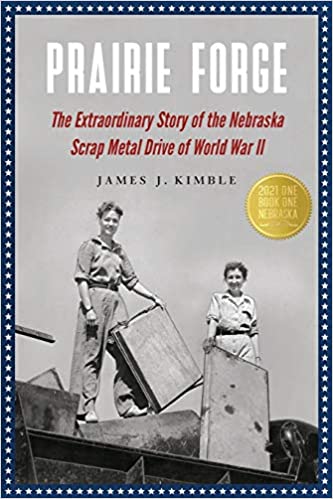Posted on January 8, 2021 by Rod Wagner
James Kimble’s Prairie Forge is the 2021 One Book One Nebraska selection. Prairie Forge is the story of a remarkable undertaking, launched in Nebraska, that inspired replication throughout the United States. With the United States entering World War II and the urgent need for resources, iron production was needed in ever-greater quantities for production of ships, planes, vehicles, weapons, and many other military necessities. Scrap metal was a critical need. That was the impetus for the Nebraska scrap metal drive of 1942.
Henry Doorly, Omaha World Herald publisher, inspired by a challenge from his wife, Margaret Hitchcock Doorly, initiated a scrap metal collection project in Omaha. With motivation and dedication, Doorly developed a plan to encourage Omaha residents to donate scrap metal for the war effort. Committing the resources of the Omaha World Herald and his staff, Doorly initiated and championed the effort that expanded across Nebraska.
While not initially expected, Doorly’s plan grew from its beginning in Omaha to spread statewide. Competition among counties, businesses, communities and schools resulted in 67,000 tons of scrap metal gathered within a three week period. It wasn’t easy; there were numerous challenges and obstacles to overcome. Success resulted from motivation, inspiration, persistence, commitment to the cause, and the competitive spirit that led Nebraskans to meet the challenging goals set for the project.
The Nebraska plan and its achievements became a model for a national scrap metal drive. Ultimately, the national effort resulted in volunteer “scrappers” collecting 5 million tons of scrap. Professor Kimble contends that “the Nebraska Plan was successful because it brought the war home to civilians, enabling them to participate directly in the battle as something akin to combatants. Students, retirees, housewives, blue-collar laborers, and even children felt themselves becoming integral parts of the war.” Leadership came from many people and organizations across Nebraska, and notable were the contributions of news outlets that provided information for community organizers and other volunteers.
The scrap metal drive may be an overlooked footnote in World War II history books, but it was a significant contribution to equipping the war effort and the eventual outcome.
One book reviewer remarked that Prairie Forge should be in every Nebraska public library. Nebraskans are encouraged to read this remarkable book.
James J. Kimble, Ph.D., is Professor of Communication, College of Communication and the Arts, Seton Hall University. An expert in the communication field, he is the co-producer of Scrappers: How the Heartland Won World War II, a feature documentary on the 1942 scrap drives. James Kimble’s hometown is Norfolk, Nebraska.
Kimble, James J. Prairie Forge: The Extraordinary Story of the Nebraska Scrap Metal Drive of World War II. Bison Books. 2014.
This review was posted on the Nebraska Library Commission blog January 9, 2021, see the original post here: http://nlcblogs.nebraska.gov/nlcblog/2021/01/08/friday-reads-prairie-forge-by-james-kimble/


